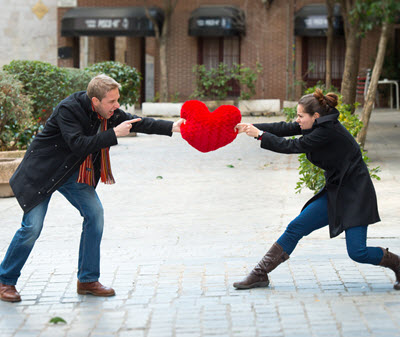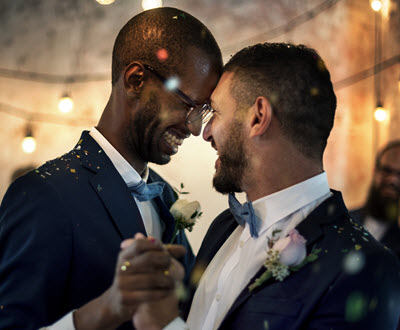Problems cannot be solved at the same level
of awareness that created them.
~Albert Einstein, Theoretical Physicist
Seeking an improved relationship
If you are checking out this webpage, I am guessing it is because you would like your relationship to look and feel more satisfying.
The bleak facts are that couples seek, on average, counseling seven years after there is a problem! SEVEN YEARS! That is 2,555 days of discomfort and discontent.
Do you get how crazy and long that is? And you thought making an appointment for the dentist was tough!
When we have a problem in our relationship, why does it take us so long to get help?
In a few words, we are afraid to be honest with ourselves and each other. I mean really honest.
 Feeling ashamed about your relationship
Feeling ashamed about your relationship
As you may expect, there are multiple reasons why we don’t seek help when we need it. The most obvious is shame and embarrassment.
Many of us feel awful about the nature of our current relationship and feel that something is “wrong with us.”
These feelings can stem from relentless bickering between partners, as well as a vast disconnection from one another.
Sex and sexual compatibility and incidents of infidelities can often show up as shame. This alone can feel so hard to talk about it with our friends, much less a therapist.
 Minority relationships
Minority relationships
If your relationship also happens to be a minority, this can be another contributing factor to your shame.
Folks of color, interracial couples, and GLBTQ folks often indicate that they feel double the internal pressure to appear as if they have a ‘healthy relationship,’ because they often feel that they are representing all couples of that one group.
This internal pressure to prove that they are just as healthy and normal as other relationships can cause them to not view their own relationship in an honest light.
The myth that relationships should be easy
Another common reason couples wait to get help is that they compare their relationships to their friends’ relationships. Remember, your friends have issues in their relationships, too; they have shame and embarrassment about aspects of their partnership.
It is likely that your friends are putting on a show for you and for themselves. Social media contributes to this false picture: “Everything is sooo great!” In other words, you may only be hearing or seeing the good parts they want you to see.
Movies and TV make it worse for real-life couples. Whether it is a drama or a comedy, it always seems that the couple resolves their differences at the end.
It seems that the overarching theme of these movie plots is, “See, that couple just had some misunderstandings. They just needed to get together on the same page; and voila, they figured it out. Why can’t WE do that?”
Nobody ever sees a therapist intervening.
In real-life, couples can feel that their relationship problems will never be resolved.
 What if I was wrong? Did I make a mistake?
What if I was wrong? Did I make a mistake?
Another common reason why couples do not seek therapy is that they do not want to admit to themselves that they might have made a mistake.
Think about it. We have invested so much into the relationship in terms of time, money, joint possessions, pets, and kids that it is hard to reconcile that we may have chosen our spouse for the wrong reasons.
This feeling reminds me of folks that are at a casino and have lost nearly all their money and refuse to accept their reality. They often say, “My luck could change at any time. I am going to stay put and keep going.”
That may be true of the quarter slots or blackjack, but it will not turn the corner for something as complex as a romantic relationship.
Doing the same thing over and over and expecting a change
Sometimes, it just seems that there is too much at stake in our relationship, so we continue for months and years waiting for things to change.
We have this myth that time will somehow make our relationship better. “After the holidays, when we move, when the kids get older, or when we have more time,” are beliefs I often hear from couples.
We want our relationship to change but are unwilling to try something different that might cause the change that we seek.
The belief that nothing can be done
One of the less spoken about reasons that couples stay together is that they are used to it.
They are aware of their unhealthy and habitual patterns, have accepted their behaviors on some level, and have experienced a phenomenon called ‘learned helplessness’ that comes from believing that nothing else can be done.
The common statement is, “We’re used to it.” Couples settle into this accepted reality and ‘double down’ to get ready for the long years ahead.
 Fear of change
Fear of change
Like accepting reality, many couples grapple with the fear of making a change.
Couples know they are unhappy and unfulfilled, but fear prevents them from moving forward or moving apart and moving on from each other.
The fear of the unknown is so powerful that in many cases it outweighs the desire to leave. This is especially prevalent in relationships involving physical, emotional, and sexual abuse.
Potential economic changes also are a big factor in hesitating to make a relationship change or seek help.
This all sounds so hopeless. No wonder half of all marriages end in divorce.
Can therapy undo all the damage from all these years of unhealthy relationship patterns?
That depends. There are many ways to determine whether the relationship is salvageable and viable. Sometimes it is obvious that the relationship is too far damaged or one or both people are not willing to continue leaning into the relationship.
I have worked with couples that decide through working with me that they will not stay together but are able to use the skills and lessons in therapy to divorce in a respectful manner.
Another popular term for an amiable divorce is ‘conscious uncoupling.’ This is especially helpful when a couple has kids or pets to share. It is paramount for couples to resist oozing their toxic feelings onto their children or expect them to be the go-between.
 Some relationships CAN and DO thrive with therapy.
Some relationships CAN and DO thrive with therapy.
I also have relationships that have flourished when couples feel safe, heard, and do not fear judgment.
As a certified marriage and family therapist, establishing that safe container when conflict is imminent is essential to learning how to speak to each other honestly and respectfully.
It is hard work, and there is no guarantee of the outcome. No wonder couples are not flocking to therapy!
 How do you work with couples? How can you help us?
How do you work with couples? How can you help us?
We begin by talking on the phone or Zoom and having a free, one-hour consultation.
If there is a willingness with all parties to move forward, we meet and begin to unravel the expectations and wishes each person had and currently has about each other and the relationship.
Develop a customized plan
Based on your communication styles, willingness, and current state of the relationship, I will customize a specific course of treatment and action.
Marriage therapy theories will be utilized, and we will incorporate the use and application of the Enneagram and the mind-body techniques that have fostered so much success. (Please see my Integrative Specialties page for more details.)
These strategies are scientifically sound and will allow you to see and experience that there is nearly always a way to see the reconciling wish for peace and love in our intimate relationships.
The fights are almost always not about each other.
What, you say? Who else can they be about?
 Clashes are nearly always about us and the way we see ourselves and our partner.
Clashes are nearly always about us and the way we see ourselves and our partner.
We have messages absorbed from our own upbringing, and we consciously or unconsciously superimpose or insert them onto our current relationship and expect our partner to behave and comply.
The trouble is that our partner is doing the same thing with us, and they didn’t grow up with the same rules and expectations. They were shown love differently than you.
Likely, you both did not have excellent role models to demonstrate how to give and receive love.
You can see how difficult it can be to have our needs met, because we are not completely aware of what we need. Can you see how difficult it is to communicate honestly and clearly to our partner?
What if my partner refuses to go to therapy?
One of my favorite sayings is that, “You can lead a horse to water, but you have to have a thirsty horse.” You cannot make anyone become thirsty. Look how hard it is for us to change, let alone trying to make our partner change!
If your partner is unwilling to seek therapy, I would recommend that you seek therapy on an individual basis, so that you can sort out what you want and need – and then obtain support during this time.
 Insight into you is essential.
Insight into you is essential.
No matter the outcome of your relationship, it is inherently paramount for you to gain insight into you. After all, if you break up and start dating, you will be repeating the same semiconscious patterns that landed you in the last relationship.
The grim facts are that second marriages end in divorce 60% of the time, and third marriages have only a 27% chance of being successful.
You have a choice – Evolve or Repeat. In which are you interested?
Start evolving now! Call or write me a message below, and we will begin!

